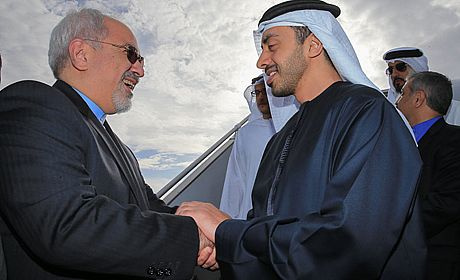Détente in Iran-UAE Relations

The Foreign Minister of the UAE has stated in his meeting with Mohammad Javad Zarif that we are Iran’s neighbor but we would like to expand our relations and become Iran’s partner. It seems that considering the conditions which dominated the region during the past few years, relations between Iran and the UAE became cold. How would you assess the reasons behind this turn in positions and the present positive view with regard to relations with Iran?
The visit made by Sheikh Abdullah bin Zaed al-Nahyan to Tehran is significant. Iran and the UAE must have expanded relations in different dimensions, because the two countries are neighbors that have common political interests and concerns. Iran has expanded relations with the UAE in consulate affairs and a few hundred thousand Iranians live in this country. Many Iranian businessmen have invested in the UAE and at one time Iran’s economic trade with the UAE reached 20 billion Dirhams, which was very high.
It was not acceptable at all that tension appeared in our relations with the UAE. The UAE was the first country in the Persian Gulf that welcomed this agreement following Iran’s agreement with the P5+1 and then Sheikh Abdullah came to Iran. All of these issues are positive steps which would impact the establishment of constructive relations. Iran will be a long term partner for the UAE as in the past because good relations would benefit both countries. The UAE’s economy will grow through having good relations with Iran and, as Iranians have hitherto played a serious role in the development of the UAE, they will continue to do so in the future as well. I consider this visit a positive one and the UAE officials have taken a timely step by comprehending the situation of the Islamic Republic of Iran and the future of Iran’s relations with the foreign countries and I have no doubt that this step will be positively and similarly responded by the officials of the Islamic Republic of Iran.
There has been talk of consultations on the issues of Syria and Afghanistan. But it is obvious that Iran and the UAE have had different opinions with regard to Syria since the beginning of this crisis. Could these two countries reach a common point bearing in mind that they have different opinions in this regard?
It is not strange that two countries or even two countries which have good relations with each other have different opinions about an international issue. Iran and Turkey have very close relations but there was a very deep difference of opinion among them with regard to the issue of Syria. The important thing is that both sides should be able to understand each other and pursue the issues in a friendly atmosphere. It has gradually been proven with regard to Syria that Iran’s positions were right and it has become clear to everyone that Bashar Assad’s opponents do not have a popular base in that country and are present with the financial and military support of the foreign countries and by threatening the people. It seems that there is a good opportunity for the UAE to become familiar with Iran’s view regarding Syria and other issues such as Afghanistan and these countries should help in resolving the Syrian crisis through a diplomatic solution and talks and not with foreign aids. The other issue is that the Arab and Emirati friends of Iran must know that if these radical groups succeed in a country like Syria, they will later enter their own countries as well and will not be safe from them. Therefore, although the positions of the two countries are different with regard to the issue of Syria, it can be a serious issue for dialogue and resolving the crisis in this country.
The Foreign Ministers of two countries have also talked about radicalism and sectarianism. What commons steps could Iran and the UAE take with regard to this issue and preventing war between the Shiites and Sunnis?
It seems that the Emiratis welcome such cooperation. Some issues threaten Iran and the UAE such as narcotics about which there has been good consular cooperation between Iran and the UAE with regard to coast guards because in some cases, narcotics enter Iran from the eastern borders and are transferred to Europe and some rich Persian Gulf countries including the UAE. Another issue is radicalism and terrorism. If terrorism is expanded in the region, no country would be safe from it, hence, the issue is not one or two countries; all countries would be involved in this matter and be damaged by it. Therefore, narcotics and terrorism are common issues of concern for cooperation between Iran and the UAE and there was good cooperation in this regard in the past as well. When Iran was under the pressure of oppressive sanctions, the Emiratis attempted to stand by Iran despite all the problems they were faced with. Even in Iraq’s imposed war against Iran, the UAE remained neutral and did not support Saddam.
What are the common and different points of view in relations between the two countries?
During the past three, four years, relations between Iran and the UAE reached the minimum level and were mainly limited to noninstitutionalized economic cooperation. Of course there have been contacts between the two countries which have not been made public, especially between the financial ministries of the two countries. But politically, relations between the two countries were at their minimum and were mainly economic. In general, the level of relations was not acceptable. We hope that the visit made by Sheikh Abdullah can be effective in the expansion of relations in all aspects in the future.

